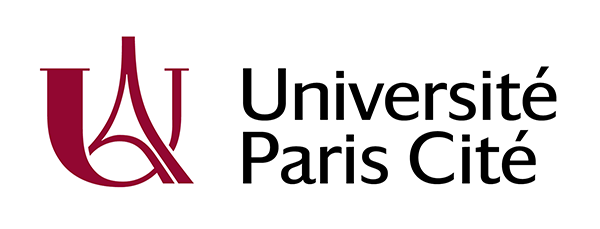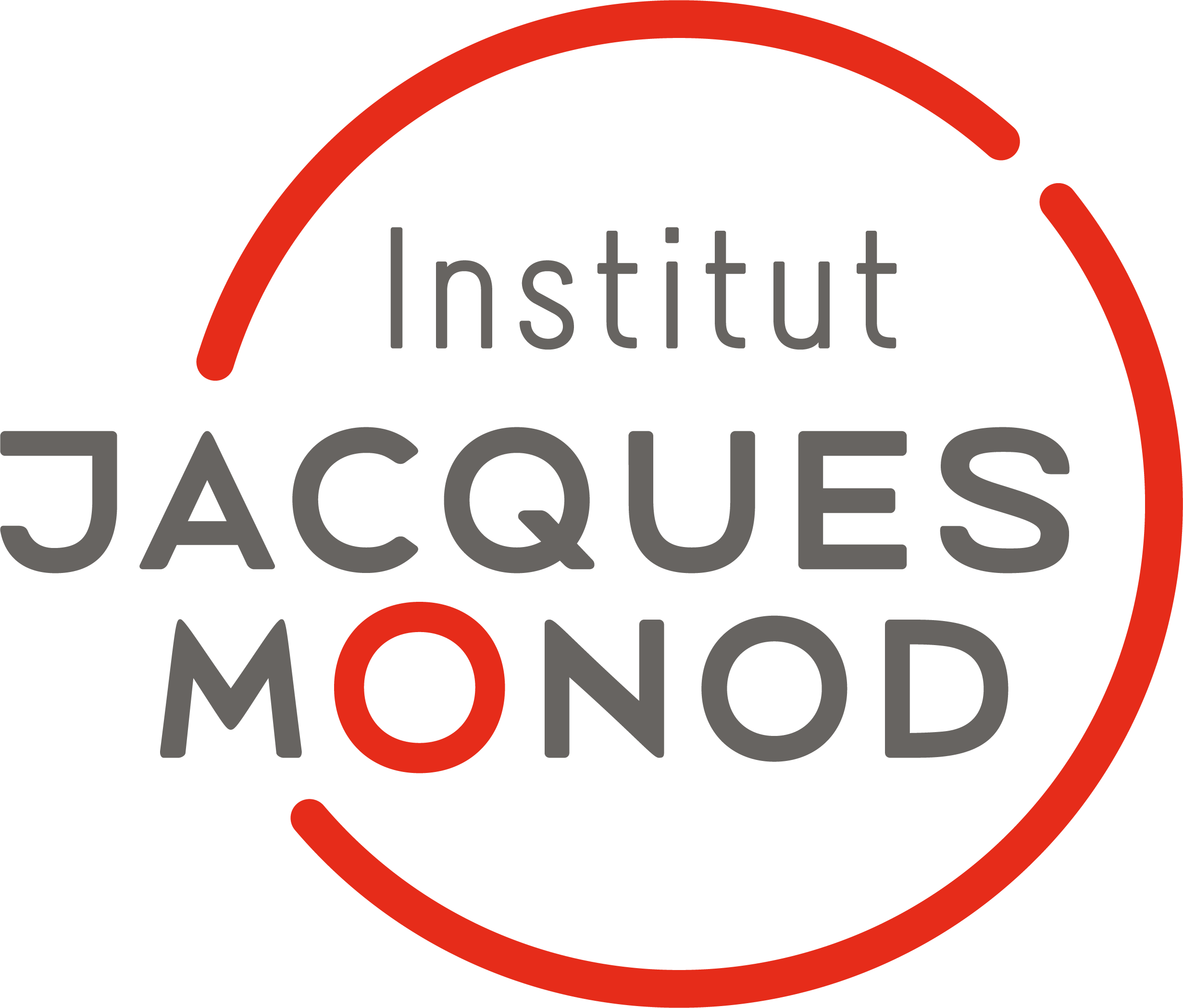Supervisory institutions & Partners
Supervisory institutions
University Paris Cité

With its 63,000 students, 4,608 researchers and teacher-researchers, 2,704 administrative and technical staff and 119 research structures and units, the University Paris Cité participates in the incarnation of a world city, conscious of its place and its missions, open to the world, to youth and to knowledge.
In a French landscape that is being restructured into major clusters, with the ambition of recreating several world-class universities in France, University Paris Cité represents a leading research force that is already highly visible nationally and internationally.
With its 12,100 students, 50 research laboratories and 3,450 researchers, teacher-researchers, administrative and technical staff, the Faculty of Science is one of the three major university faculties in Paris.
It is made up of nine components: five UFRs are located on the Grands Moulins campus (Chemistry, Computer Science, Mathematics, Life Sciences, Physics) as well as an engineering school. The Saint-Germain des Prés campus is home to the Fundamental and Biomedical Sciences Faculty and the Mathematics/Computer Science Faculty. The ZAC Pajol is home to the IUT of Paris Pajol.
The Faculty of Science combines experimental and exact sciences, basic and applied research. It has a wealth of disciplines such as biology, chemistry, computer science, mathematics, physics and biomedical sciences.
CNRS
The National Centre for Scientific Research (CNRS) is one of the most important research institutions in the world. To meet the major challenges of the present and the future, its scientists explore life, matter, the universe and the functioning of human societies. Internationally recognised for the excellence of its scientific work, the CNRS is a reference in the world of research and development as well as for the general public.
The Institut Jacques Monod is attached to the Institute of Biological Sciences (INSB). To explore and describe living organisms, as well as to decipher how they function, the INSB encourages risk-taking research motivated by curiosity. It encourages the crossing of disciplines, accompanies technological developments and supports international collaborations. The institute has thus become a major player in the progress of biological sciences on the world stage.
Partnerships & Supports
Inserm
Created in 1964, the Inserm is a public institution of a scientific and technological nature, under the dual supervision of the Ministry of Health and the Ministry of Research. Dedicated to biological, medical and human health research, it is positioned along the entire path from the research laboratory to the patient’s bed. On the international scene, it is the partner of the most important institutions involved in the scientific challenges and progress in these fields.
Foundation for Medical Research (FRM)
Serving research and health for more than 70 years, the Fondation pour la Recherche Médicale (FRM) is the largest charitable funder of French medical research on all diseases: cancers, Alzheimer’s disease, cardiovascular diseases, infectious diseases, diabetes, multiple sclerosis, Parkinson’s disease, rare diseases, etc.
Each year, it supports more than 400 new research projects carried out in the laboratories of public research and higher education organisations (INSERM, CNRS, INRA, CEA, universities, grandes écoles, health establishments, etc.).
The MRF is independent and works thanks to the generosity of its donors, testators and partners.
The Fondation pour la Recherche Médicale is recognised as being of public utility and is certified by the Don en Confiance.
The French league against cancer
Created in 1918, the Ligue contre le cancer is an association under the law of 1901, recognised as being of public utility. It relies on the generosity of the public and the commitment of its volunteers and employees, who are trained by an approved training school to meet the needs of people affected by cancer. ![]() 103 departmental committees throughout the country, is non-political and financially independent.
103 departmental committees throughout the country, is non-political and financially independent.
ARC Foundation
The ARC Foundation’s mission is tofight cancer through research. With its national and international expertise, it implements a scientific policy based on three strategic areas that meet the current needs and challenges of cancer research:
- Support basic research to increase knowledge on all cancers and in all scientific and medical fields: genetics, immunology, biology and cellular metabolism, pharmacology, etc.
- To accelerate clinical and translational research, allowing access to therapeutic innovations for all, children and adults.
- To bring out talentby creating the conditions for a search for excellence and by relying on a proactive, long-term policy based on training, identification and attraction of new skills.
The ARC Foundation intends to accelerate research in two priority areas: the development of innovative therapies in precision medicine (targeted therapies, immunotherapies, minimally invasive surgery, etc.) and the treatment of children and adolescents with cancer.
Its action is completely independent and covers the whole country: guided by the general interest and scientific excellence, it identifies, selects, finances and supports promising research programmes.
INCa
The National Cancer Institute (INCa) is the State’s health and scientific cancer agency responsible for coordinating the fight against cancer. Created by the public health law of 9 August 2004, it is placed under the joint supervision of the Ministry of Solidarity and Health on the one hand, and the Ministry of Higher Education, Research and Innovation on the other.
Labex Who Am I?
The Labex Who Am I? is an interdisciplinary project, bringing together teams of biologists, physicists, psychoanalysts, historians and philosophers of science around the central question of identity. Together, we explore the determinants of identity at various scales (chemical, molecular, cellular and social) through collaborative approaches
Fondation Bettencourt Schueller
Both a family foundation and a foundation recognised as being of public utility since its creation, the Bettencourt Schueller Foundation intends to “give wings to talent”, to contribute to the success and influence of France.
To do this, it seeks out, selects, supports, accompanies and promotes women and men who are imagining tomorrow’s world today, in three fields that contribute concretely to the common good: life sciences, the arts and solidarity.
Fondation Groupama Santé
In 2000, on the occasion of its centenary, Groupama chose to illustrate its mutualist values of solidarity and proximity by creating the Groupama Foundation. This corporate foundation is committed to “beating rare diseases”.
Région Ile-de-France
The Region encourages innovation and research and wishes to offer students and researchers the best living and working conditions. Funding of Genopole, Blaise Pascal Chairs of Excellence, Domaine d’intérêt majeur (DIM), Prix des Innovateurs, scientific and technical equipment and incubators…
GIS IBiSA
The GIS IBiSA supports investments in a wide range of platforms and resources in biology, health and agronomy, open to the scientific community.
The Institut Jacques Monod’s ProtéoSeine platform has received the IbiSA label.
Idex university of Paris
Within the framework of its IdEx, the University of Paris implements innovative and structuring programmes in the fields of research, international affairs, training and student life, and knowledge transfer. These programmes are funded by income from an endowment granted to IdEx Université Paris 2019 and are deployed in collaboration with the research organisations and partner institutions of the IdEx consortium.
French National Research Agency (ANR)
The National Research Agency (ANR) is a public administrative institution under the supervision of the Ministry of Higher Education, Research and Innovation. The Agency implements project-based research funding for public operators in cooperation with each other or with companies.
ERC (European Research Council)
The ERC’s mission is to encourage the highest quality research in Europe through competitive funding and to support investigator-driven frontier research across all fields, on the basis of scientific excellence.
GEFLUC PARIS ILE-DE-France
For more than 50 years, Entreprises contre le Cancer has been mobilising the business world in the fight against cancer around 3 priorities:
- Support for innovation in cancer research and for Made in France researchers.
- Advocacy for a better understanding of the reality of cancer in the workplace.
- Animating the community of actors in the fight against cancer in companies.
L’Association Française de l’Ataxie de Friedreich (AFAF)
The French Friedreich’s Ataxia Association was created on 17 January 1980 by Bernard Verne and Clémentine Oddos, both affected by the disease. It has over 900 members, including 500 people with ataxia. Its objectives are:
– To help medical research, by participating in its financing and collaborating in certain studies.
• Promouvoir l’information sur la maladie et le suivi.
– To create bonds of friendship between members.
– Supporting patients and families in their daily lives by providing information and contacts.

